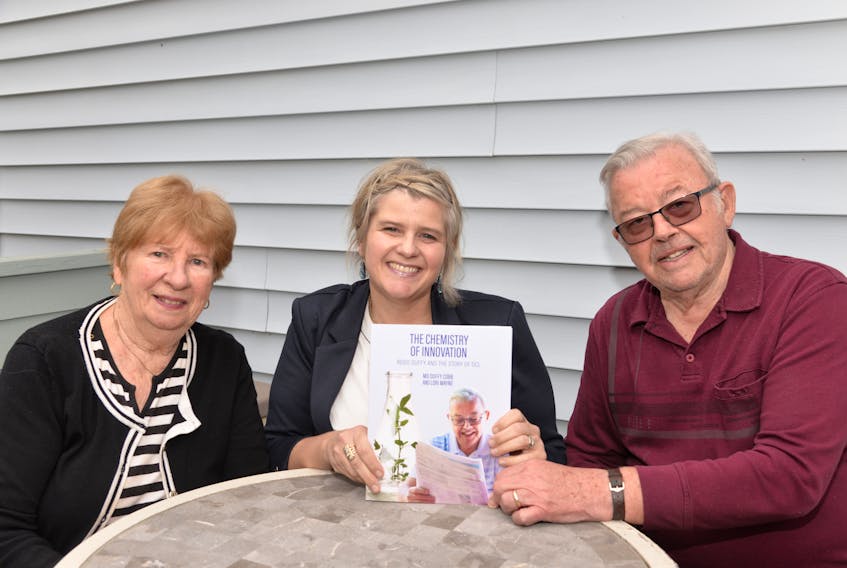Terrence McEachern · Reporter | Posted: May 22, 2021, 7:55 a.m. | Updated: May 22, 2021, 12:31 p.m. | 3 Min Read12

P.E.I.’s bioscience sector could look much different than it does today had its pioneer entrepreneur Regis Duffy stuck with another career option – ordained priest.
“Well, chemistry was an accident,” said Duffy with a laugh.
Duffy was referring to a part in a new book – The Chemistry of Innovation: Regis Duffy and the story of DCL (Diagnostic Chemicals Limited) – written about his life and contribution to P.E.I.’s bioscience sector. The book was co-written by Mo Duffy Cobb, who is Duffy’s daughter, and Lori Mayne. Cobb said the book took about two years to research and write. It was published by Island Studies Press at UPEI and is available on P.E.I. at The Bookmark, the UPEI bookstore, Indigo, Coles, and online at Nimbus.ca.
Duffy was born in 1932 in Kinkora, P.E.I., grew up in a farming family and graduated from St. Dunstan’s University with a bachelor of arts degree in 1953. He decided to pursue a life in the priesthood and left for Halifax to study at Holy Cross Seminary. After graduating, he returned to Charlottetown and was ordained as a priest in 1957 at St. Dunstan’s Basilica in Charlottetown.
However, Duffy was approached by Father John Sullivan, the rector of Saint Dunstan’s University, about an appointment in the chemistry department. Duffy agreed and left for Fordham University in New York City to study chemistry.
In the book, Duffy admits being reluctant about the transformation into a chemist. But he also understood that the university was looking for a replacement for Fr. Fred Cass, who taught Duffy a couple of chemistry courses years earlier at St. Dunstan’s and was nearing retirement. So Duffy agreed to go to Fordham. In 1962, graduated with his Ph.D. in chemistry and returned to St. Dunstan’s University.
In 1969, St. Dunstan’s became part of the newly created University of Prince Edward Island (UPEI). Duffy was a professor, chair of the chemistry department and UPEI’s new dean of science. In 1970, he launched DCL.
As the book explains, in 2007, Duffy sold Diagnostic Chemicals for $53 million – the same company he started with one customer, $9,384 in sales and losses of around $3,700 in its first year. After the sale, the company’s employees were given an envelope with cheques inside and a share of the profit.
“I was always a strong believer in profit sharing. We did that all through the history of the company,” he said. Duffy said some keys to his success at growing the company were an interest in sustainable communities, management skills and finding smart people.
“Because you can’t do it all yourself. And when you find them, you have to give them the responsibility and the resources, and then don’t get in their way,” he said. Another reason for the company’s success was timing. Duffy explained that prior to 1970, a good lab technician could do about 50 diagnostic tests a day. But around the time Duffy started DCL – a company that specialized in creating diagnostic testing kits, chemical compounds and reagents – the technology improved to allow for faster testing of around 200 tests an hour.
“We just happened to be there at the right time,” he said.
The company that Duffy started on tiny Prince Edward Island had sales beyond Canada in the U.S., Southeast Asia, France, Germany and Italy. When it was sold in 2007, DCL had created more than 300 compounds and more than 200 diagnostic products and reagents. Cobb said a takeaway from the book is that to be innovative, someone also needs to be creative. And if something doesn’t work, get up the next day and try something new.
Duffy adds another takeaway from the book and his life story: “It shows you what can be done.”
Did you know?
• Regis Duffy has a long list of well-known accolades, including the Order of Canada and Order of Prince Edward Island.
• He was also a Charlottetown city councillor and the first chair of the P.E.I. Bioalliance.
• At UPEI, there is the Regis and Joan Duffy Research Centre, and in the Biocommons Research Park, there is Regis Duffy Drive.
• Diagnostic Chemicals is also known for two spinoff companies in Charlottetown – BioVectra, which started out as a division of DCL created by Duffy, and Sekisui Diagnostics.